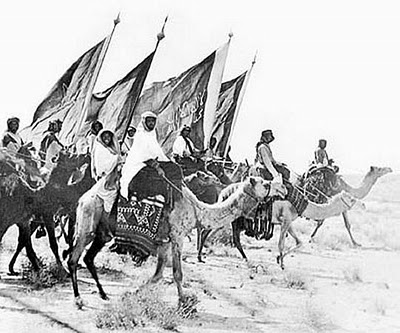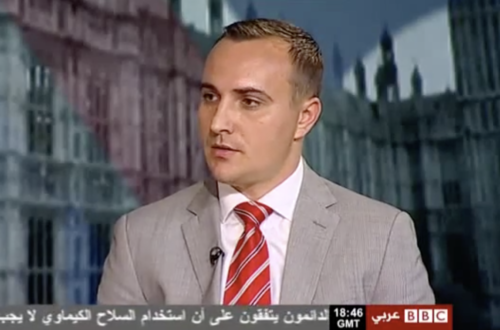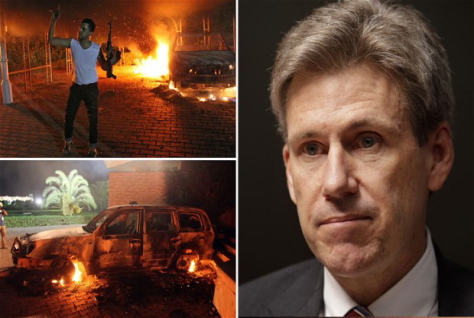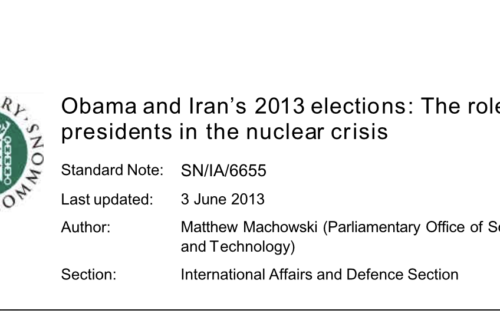Qatar – Modernity’s Neopatrimonial Edition?
| Gulf Cooperation Council Meeting. |
by Matthew Machowski
The widespread ‘rentier mentality’ in the Gulf has undoubtedly led to a massive popular socio-economic advancement that not only has affected a wide variety of aspects of life in Qatar,[1] but also has “enabled the state to structure existing groups into a patron–client order,” as advanced by Krause.[2] Rentierism has further strengthened the traditional patrimonial institutions of governance, typically prevalent in the pre-oil era Qatar.[3] She further notes that the modern Qatari state has allowed “a rentier-based ‘ruling bargain’ being forged between the elite state actors and the technocrats of the new middle class.”[4] Rentierism and the patrimonial form of governance appear to be very well attuned to each other, thus creating a truly hybrid allocationist “patrimonial rentier regime” in Qatar.[5] These phenomena are fundamental to a correct understanding of the complexity of political liberalisation in Qatar by providing us with an essential background that further explicates Qatar as being a complex case of hybrid political system.
Bill and Sprinborg correctly note that although all societies are created around some “interrelated networks and groups, there is always one group of individuals that has a disproportionate amount of power and political influence.”[6] The Middle East, as “the last stronghold of absolute monarchy,” has an age-old tradition of political power being vested in the hands of the, often authoritarian, ruler.[7]
 |
| Al Saud tribe on the Arabian desert. |
They also indicate that although it is frequently disregarded as an Orientalist statement, there appear to be some very “deep-seated and persisting similarities in rule [that] have existed throughout Islamic history.”[8] In support of such arguments, Lewis has even argued, historically “there was no state [in the Islamic world] but only a prince (ruler) and its agents.”[9] Such statements are usually comfortably quietened in Middle Eastern academia and branded as a typically American neorealist and historically inadequate rhetoric. Nonetheless, it is true that apart from the short experience of a largely ‘democratic’ early ummah’ of the four Rightly Guided Caliphs (632-661 A.D.),[10] there is very little record of any non-absolutist, non-authoritarian rule in Islam. Moreover, it has become a commonplace in the Middle Eastern Studies to consider patronage as the customary “mode of operation in political life,” as noted by Roy.[11] In fact, Bill and Sprinborg have even arguably advocated, “Islam [actually] fostered patrimonial patterns both through ideals and in reality.”[12]
The Middle Eastern tradition of patronage runs very deeply into the structures of Arab societies. Both tribalism and clannism are understood to be the constituent parts of the Middle Eastern asabiyya, as a form of solidarity group that predates any forms of modern governance in the region and often still continues to be a typical societal mode of operation in the Gulf.[13] A ‘state’, as a modern Western political mode of governance, is still perceived as foreign by a considerable proportion of the Gulf population that sees the interests of the state often irreconcilable with the interests of the particular tribes or families.
NEOPATRIMONIALISM IN QATAR
Although it is currently impossible in the Middle East “to find a ‘traditional society’ that is cut off from politics of the state,”[14] as indicated by Roy, or one that would not have joined the ‘globalising bandwagon’ of modernity, the traditional style of political rule has been successfully retained to a surprisingly large extent.[15] Tribalism, authoritarianism and privatised family-based politics, all remain prominent characteristics of the Arab state.[16] Leca and Schemeil indeed claim that one cannot even analytically confirm their decline.[17] I argue therefore, that one should only switch between the terminologies and describe the Gulf in the modern ‘neopatrimonial’ terms instead, thus indicating yet another aspect of its hybridity.
| Qatari falcon breeders in a souq in Doha. |
Neopatrimonialism, in its modern form, has been first used by Eisenstadt, who despite failing to provide a clear definition of the term has initiated a whole new scholarship on the notion of political domination through patronage and clientelism.[18] Eisenstadt’s negligence in delineating the main tenets of the theory caused Theobald to even claim that the concept of neopatrimonialism has actually “lost any of its analytical utility.”[19] However, many have since attempted to clarify its extent and problematics. This research follows, in my opinion, the most adequate definition of neopatrimonialism provided by Clapham, arguably the most relevant to the political circumstances in the Gulf. He defines the concept as “a form of organisation, in which relationships of a broadly patrimonial type pervade a political and administrative system which is formally constructed on rational-legal lines.”[20]
Although the modern Gulf State is no longer a realm of personal power relations alone, the public-private distinction, although existent, is often not very much adhered to.[21] The emergence of a large state bureaucracy and various supposedly non-governmental bodies in the Gulf increased the role of the legal-rational bureaucratic domination.[22] Nonetheless, the administrative structures of the state institutions are often grossly permeated, or even dominated, by the ultimate sovereign or his family, thus “exercising a political monopoly of the top positions” in the state, as advanced by Peterson.[23] Al Naqeeb then rightly indicates, “the state institutions [are] functional extensions of the ruling families to the point that loyalty to the state [is] in the final analysis translated as personal loyalty to the ruling family.”[24] Clearly, “informality and formality are intimately linked to each other in various ways and by varying degrees; and this particular mix becomes institutionalised”[25] into a typically hybrid neopatrimonial political system, in which “patrimonialism co-exists with, and suffuse, rational legal institutions”[26] of the modern state.
 |
| Qatarisation logo. |
The state’s dominant role in distributing the rentierist income perfectly fits into the dynamics of the neopatrimonial state, whereby the mode of domination is accompanied by practical sponsorship at the local and national level.[27] Here again the state control over the rents, and the economy in general, proves to be a great instrument of social control.[28] Juxtaposition of the centralisation of power within the Al Thani family, with some steadily increasing rent incomes from oil and gas on the one hand, and an absence of meaningful centres of social resistance on the other hand, explains the enhanced state capacity.[29]
Moreover, the state creates here its biggest clientelist network by “distributing jobs and money in exchange for loyalty from its citizens,” note Bank and Schlumberger.[30] State employment in either the state administration or the state owned enterprises, along with the resulting pensions, remain the primary mean of direct income support distribution for around, or over, 90 per cent of the population.[31] This ongoing pecuniary relation has clear political implications and exemplifies the extent of patronage within Qatar. Moreover, the recent project of Qatarisation, in which the local companies are required to provide the Qatari graduates with ‘adequate’ employment opportunities; largely irrespectively of their actual qualifications or professional experience; epitomises the typically patrimonial strategy of loyalty-seeking.[32]
The implications of this phenomenon of neopatrimonial structures of political rule have very significant implications for the prospects of future liberalisation in Qatar. As “the state floats above society,” remind Leca and Schemeil, the actual bottom up prospects of liberalisations are low.[33] Strong permeation of the state powers through the structures of society by means of significant leverage of patronage, clannism and clientelism further stifles any bottom-up movements.[34]
Matthew Machowski © 2011
BIBLIOGRAPHY:
[1] For more details of the “rentier mentality” and its effects, see: Ayubi, op. cit., 227.
[2] Krause, op. cit., 20.
[3] For further details of the tradition of governance in the pre-oil Gulf States see: J. Onley and S. Khalaf, “Shaikhly Authority in the Pre-oil Gulf: An Historical–Anthropological Study,” History and Anthropology 17, no. 3 (2006): 189-208.
[4] Krause, op. cit., 20.
[5] Luciani (1990), op. cit., 81; and S. Hertog, “Defying the Resource Curse Explaining Successful State-Owned Enterprises in Rentier States,” World Politics (Cambridge University Press) 62, no. 2 (April 2010): 261-301.
[6] J. A. Bill and R. Sprinborg, “The Politics of Patrimonial Leadership,” in Politics in the Middle East (Harper Collins College Publishers, 1994): 136.
[7] ibid.
[8] Similar argument has been purported by J. Teitelbaum after Waterbury, who notices that “self–criticism in the Arab world has increased to the point where ‘had it come from other pens, [it] would have been dismissed as stereotypical Orientalism.” See: ibid., p. 137; and Teitelbaum (2008), op. cit., 9.
[9] B. Lewis, The Emergence of Modern Turkey (Oxford: Oxford University Press, 1968): 393.
[10] The term ‘ummah’ is commonly used to describe the Islamic community of believers. Additionally, the term has been frequently accredited with much of political connotations. Many have since understood ‘ummah’ as an Islamic empire. ‘Ummah’ is repeatedly romanticised by various Islamist movements and used to explicate the fundamentalist duality of the world (the Muslim ummah vs. the West) along the typically Huntingtonian, ‘civilisationist’ lines.
[11] O. Roy, “Patronage and Solidarity Groups: Survival or Reformation,” in Democracy Without Democrats? The Renewal of Politics in the Muslim World, trans. J. Mabro, 270-81 (New York: I.B. Tauris, 2001): 270.
[12] Bill and Sprinborg, op. cit., 155. This argument is however highly arguable and could even be read as an insinuation of incompatibility of Islam with a democratic form of governance. Although Bill and Sprinborg correctly indicate that Islam does require its followers to submit themselves to the Almighty; a religious tenet that has been continuously misappropriated in order to legitimise an authoritarian and often unfair rule; it also leaves a lot of free space for both an individual and the entire community in their own exercise of governance. This theme cannot be further explained here, however for details see: N. J. Coulson, “The State and The Individual in the Islamic Law.,” The International and Comparative Law Quarterly (Cambridge University Press) 6, no. 1 (January 1957): 49-60; A. S. Moussalli, The Islamic Quest for Democracy, Pluralism, and Human Rights. (Gainesville, FL: University Press of Florida, 2001; B. Tibi, “The Clash of Shariah and Democracy.,” The New York Times, September 16, 2005, http://nyti.ms/agmmGG (accessed December 1, 2009). Moreover, as Stepan and Robertson rightly maintain Islam cannot be the main cultural obstacle for democracy. They have successfully isolated the Islamic variable by indicating in their research that while sixteen out of forty-seven Muslim majority countries severely ‘underachieve’ in their measure of democracy based on an electoral competitiveness, thirty-one other Muslim majority countries ‘greatly overachieve’. The have instead noticed that a possible fault line may lie along the Arab/non-Arab state divisions. See: A. Stepan and G. Robertson, “An ‘Arab’ More Than a Muslim Electoral Gap,” Journal of Democracy 14, no. 3 (July 2003): 30-44. For similar see: F. Pryor, “Are Muslim Countries Less Democratic,” Middle East Quarterly 14, no. 4 (Fall 2007).
[13] Roy, op. cit., 270. The past experiences of an electoral process in the Gulf, i.e. Kuwait, Qatar, UAE and Iraq, all indicate the persistence of this societal trend. It is often argued that ideology still does not precede the tribe or the extended family interests. For further information see: Crystal (1989), op. cit.; Meulen, op. cit.; and M. P. Posusney, “The Middle East’s Democracy Deficit in Comparative Perspective,” in Authoritarianism in the Middle East: Regimes and Resistance, ed. M. P. Posusney and M. P. Angris, 1-18 (Boulder: Lynne Rienner Publishers, 2005): 5.
[14] Roy, op. cit., 273.
[15] Bill and Sprinborg, op. cit., 161-2.
[16] A. Billingsley, “Political Succession in The Gulf: A System Under Strain. – Middle East Studies Association (MESA) of North America 2004 Conference Paper,” Macquarie University, November 2004, http://bit.ly/9quglW (accessed October 9, 2009).
[17] J. Leca and Y. Schemeil, “Clientélisme et Patrimonialisme dans le Monde Arabe,” International Political Science Review / Revue Internationale de Science Politique (Sage Publications, Ltd) 4, no. 4 (1983): 475.
[18] G. Erdmann and U. Engel, “Neopatrimonialism Revisited – Beyond a Catch-All Concept,” GIGA Working Papers Series (GIGA Research Program: Legitimacy and Efficiency of Political Systems) 16 (February 2006: 8.
[19] R. Theobald, “Patrimonialism: Research Note,” World Politics (John Hopkins University Press) 34, no. 4 (July 1982): 555.
[20] C. Clapham, Politics in the Third World: An Introduction (Madison: University of Wisconsin Press, 1985): 48. For a broadly similar definition see: Erdmann and Engel, op. cit., 18.
[21] Kamrava reminds that Qatar remains governed by a traditional “sheikhly pattern of rule”, in which personalised politics and reliance on patronage are of central importance. See: Erdmann and Engel, op. cit., 18; and M. Kamrava, “Royal Factionalism and Political Liberalization in Qatar,” Middle East Journal 63, no. 3 (Summer 2009): 402-3.
[22] Nonetheless, many of the so called ‘non-governmental organisations’ (NGO) or ‘semi-governmental semi-private institutions’ in Qatar are hardly politically independent, i.e. Qatar Charity, supposedly an NGO very actively engaged in humanitarian activities is continuously led by the Al Thani family. Moreover, according to the Qatari legislations all NGOs require a governmental permission to operate. See: Kamrava, op. cit.; Gause III (1994), op. cit., 74; and Qatar Charity, “Qatar Charity Honors its Previous Board of Directors and Long-Service Personnel,” August 4, 2010, http://bit.ly/aYnp9r (accessed August 8, 2010); and Freedom House, “Qatar – Country Report 2010,” 2010, http://bit.ly/cVazdm (accessed August 10, 2010).
[23] Al Thanis maintain a comparatively tighter hold over the Cabinet positions than any other GCC state, thus perhaps indicating their authoritarian side of the hybrid structures of the state. Following the last Cabinet reshuffle, effective as of May 2009, seven out of seventeen state ministries have been led by members of the ruling family. Additionally, two out of the three Qatari equivalent of The Great Office of State (Foreign Affairs, Interior, and Finance) remain strongly in the hand of the Al Thanis. See: J. E. Peterson, “Rulers, Merchants and Sheikhs in Gulf Politics: The Function of Family Networks,” in The Gulf Family: Kinship Policies and Modernity, ed. A. Alsharekh (London: Saqi Books, 2007): 21; Central Intelligence Agency, United States of America, “Chiefs of State and Cabinet Members of Foreign Governments: Qatar,” June 17, 2010, http://bit.ly/aIpvXO (accessed August 8, 2010); and Gause III (1994), op. cit., 73.
[24] Al-Naqeeb, op. cit., 103. For similar see: Gause III (1994), op. cit., 76; and A. Rathmell and K. Schulze, “Political Reform in the Gulf: The Case of Qatar,” Middle Eastern Studies (Frank Cass) 36, no. 4 (October 2000): 56.
[25] Erdmann and Engel, op. cit., 18.
[26] M. Bratton and N. van de Walle, “Neopatrimonial Rule in Africa,” in Democratic Experiments in Africa: Regime Transitions in Comparative Perspective (Cambridge: Cambridge University Press, 1997): 62.
[27] Leca and Schemeil, op. cit., 479-480.
[28] ibid.
[29] Kamrava, op. cit., 405.
[30] A. Bank and O. Schlumberger, “Jordan: Between Regime Survival and Economic Reform,” in Arab Elites: Negotiating the Politics of Change, ed. V. Perthes, 35-60 (Boulder and London: Lynne Rienner Publishers, 2004): 51.
[31] M. Herb, Parliaments, Rentier Labor Markets, and Economic Diversification in Kuwait and the UAE, Conference Paper, 2008 Annual Meeting of the American Political Science Association (American Political Science Association, 7 August 2008): 10-11.
[32] The Qatarisation project, along with the extensive welfare state provisions, is claimed to highly impede the creation of any natural civil society structures in the country, thus further restricting the political reforms to a top-down, limited and carefully programmed opening, which leaves the country in a hybrid state of liberalised authoritarianism. See: Kamrava, op. cit., 406.
[33] Leca and Schemeil, op. cit., 475-6.
[34] The Arab authors of the 2004 Arab Human Development Report have suggested similar argument, in which they perceive clannism and the structures of the Arab family patronage as social frameworks that enforce submission and stifle personal and political freedoms. See: United Nations, The Arab Human Development Report for 2004; Towards Freedom in the Arab World (New York: United Nations, 2005): 17.


